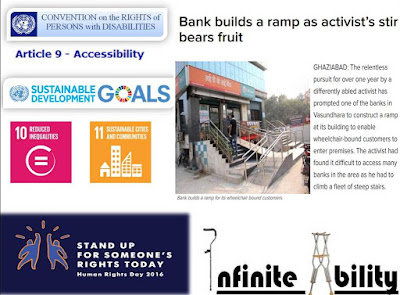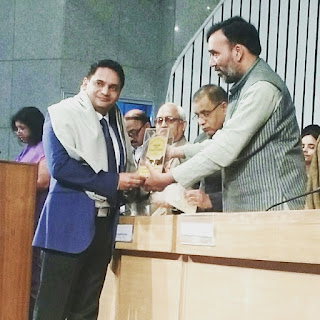Introduction: 7 Feb, 2014
Com. Ref.: 16 Sept 2014
Com. Rep.: 7 May, 2015
Rajya Sabha: 14 Dec 2016 (Passed)
Lok Sabha: 16 Dec 2016 (Passed)
Activists term disability bill a 'skeptical Act'
TIMES OF INDIA, Delhi, 16 Dec
NEW DELHI: Even as the Rights of Persons with Disabilities Bill 2016 got the approval of Lok Sabha on Friday and Rajya Sabha on Wednesday, disability rights' groups and activists punched holes into the new Act on Friday. While welcoming the passing of the bill, the process which started in 2007, they say that many provisions of the bill will "inculcate exclusion," and that "this Act will be more of obstacles rather than implementation." Activists are also concerned with the bill not specifying any provisions for women and children with disabilities, who are among the most vulnerable groups of the society.
Concerned over the passing of the bill without any discussion in the Upper House of the Indian Parliament, Sambhavana Organization, a disability rights' NGO said that due to this "the Bill has been passed with many inadequacies and unresolved issues," many of which they claim were part of the previous draft bills "which have been omitted or diluted in the present one."
"We feel happy with the passing of the Bill, but are concerned over the fact that there has been no discussion on it in the Rajya Sabha. This means the issue of disability is not a priority for the policy makers," said Nikhil Jain, president, Sambhavana.
While the categories of disabilities have increased threefold, from seven to 21, the amended bill provides only 4% reservation for Persons with Disabilities (PwDs) which has been 3% so far. The rights' groups and activists were demanding retention of at least 5%. "Reservation in jobs, once proposed to be enhanced from 3% (1995 Act) to 5% (2014), has now been restricted to 4%," said disability right's activist, Dr Satendra Singh.
Stating that the United Nations Convention on the Rights of Persons with Disabilities, which India is a signatory envisage "no policies without the PwDs in its ambit," Pankaj Sinha, a disability rights activist said that the rights of the disabled have been curtailed by the new Bill.
"The amendments have been in waiting since 2007 and drafts of many committees rejected. The previous government also tried to pass an ordinance after the Sudha Kaul committee report was not accepted. The present government without putting the draft in public domain passed it," said Sinha.
Stating that the Bill leaves a lot of lacunas for violators to get scot free, activists said that need of the hour has been more teeth for punitive action. "Another amendment drops imprisonment (two months to six months) for violation. There is only a fine of Rs 10,000 to Rs 5 lakh," added Singh.
Another major concern has been regarding the rights of women and children with disabilities. "There is a special mention about rights of women and children with disabilities, but nothing specific has been stated. There is no legal provision for women with disabilities in marriage or divorce laws, where we need more clarity because they suffer the most. As far as children with disabilities are concerned there is also a special mention, but we need to clarity on how they are treated in institutions and inclusive education for them. In adoption laws too children with disabilities are left out. We need more specific provisions regarding adoption of children with disabilities," said Abha Khetarpal, president, Cross for Hurdles.
Subhash Chandra Vashishth, advocate, disability rights, Centre for Accessibility in Built Environment, also highlighted the dilution in the amendments such as how Section 3 (3) allows "discrimination against disabled person if it is 'a proportionate means of achieving a legitimate aim.' This clause leaves 'legitimate aim' open to the subjective interpretation of bureaucracy.
According to Singh, "Only remarkable part of a skeptical Act is inclusion of autism, dyslexia, deaf-blindness and other impairments."
The Blind Workers Union too claimed that the main problems faced by the disabled community have not been addressed. The union in a statement said, "The Bill continues to lack any serious engagement on the question of protecting the labour and economic rights of disabled persons employed in the private sector."
Source: Times of India, 16 Dec 2016
NEW DELHI: Even as the Rights of Persons with Disabilities Bill 2016 got the approval of Lok Sabha on Friday and Rajya Sabha on Wednesday, disability rights' groups and activists punched holes into the new Act on Friday. While welcoming the passing of the bill, the process which started in 2007, they say that many provisions of the bill will "inculcate exclusion," and that "this Act will be more of obstacles rather than implementation." Activists are also concerned with the bill not specifying any provisions for women and children with disabilities, who are among the most vulnerable groups of the society.
Concerned over the passing of the bill without any discussion in the Upper House of the Indian Parliament, Sambhavana Organization, a disability rights' NGO said that due to this "the Bill has been passed with many inadequacies and unresolved issues," many of which they claim were part of the previous draft bills "which have been omitted or diluted in the present one."
"We feel happy with the passing of the Bill, but are concerned over the fact that there has been no discussion on it in the Rajya Sabha. This means the issue of disability is not a priority for the policy makers," said Nikhil Jain, president, Sambhavana.
While the categories of disabilities have increased threefold, from seven to 21, the amended bill provides only 4% reservation for Persons with Disabilities (PwDs) which has been 3% so far. The rights' groups and activists were demanding retention of at least 5%. "Reservation in jobs, once proposed to be enhanced from 3% (1995 Act) to 5% (2014), has now been restricted to 4%," said disability right's activist, Dr Satendra Singh.
Stating that the United Nations Convention on the Rights of Persons with Disabilities, which India is a signatory envisage "no policies without the PwDs in its ambit," Pankaj Sinha, a disability rights activist said that the rights of the disabled have been curtailed by the new Bill.
"The amendments have been in waiting since 2007 and drafts of many committees rejected. The previous government also tried to pass an ordinance after the Sudha Kaul committee report was not accepted. The present government without putting the draft in public domain passed it," said Sinha.
Stating that the Bill leaves a lot of lacunas for violators to get scot free, activists said that need of the hour has been more teeth for punitive action. "Another amendment drops imprisonment (two months to six months) for violation. There is only a fine of Rs 10,000 to Rs 5 lakh," added Singh.
Another major concern has been regarding the rights of women and children with disabilities. "There is a special mention about rights of women and children with disabilities, but nothing specific has been stated. There is no legal provision for women with disabilities in marriage or divorce laws, where we need more clarity because they suffer the most. As far as children with disabilities are concerned there is also a special mention, but we need to clarity on how they are treated in institutions and inclusive education for them. In adoption laws too children with disabilities are left out. We need more specific provisions regarding adoption of children with disabilities," said Abha Khetarpal, president, Cross for Hurdles.
Subhash Chandra Vashishth, advocate, disability rights, Centre for Accessibility in Built Environment, also highlighted the dilution in the amendments such as how Section 3 (3) allows "discrimination against disabled person if it is 'a proportionate means of achieving a legitimate aim.' This clause leaves 'legitimate aim' open to the subjective interpretation of bureaucracy.
According to Singh, "Only remarkable part of a skeptical Act is inclusion of autism, dyslexia, deaf-blindness and other impairments."
The Blind Workers Union too claimed that the main problems faced by the disabled community have not been addressed. The union in a statement said, "The Bill continues to lack any serious engagement on the question of protecting the labour and economic rights of disabled persons employed in the private sector."
Source: Times of India, 16 Dec 2016










